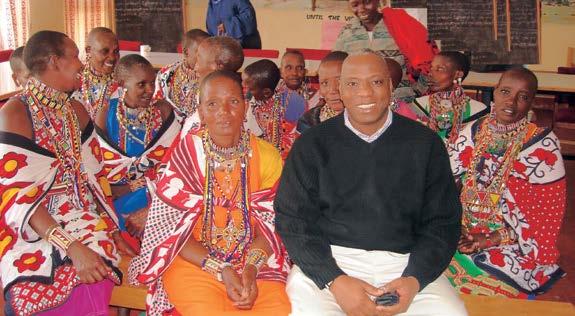
18 minute read
A Celebration of the African History and Heritage
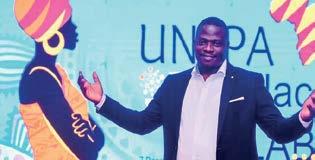
Advertisement
this crisis.
“several interventions to end FGM have been implemented but what we are missing is what we have right now, the creativity and energy of young people,” said Mr. Alemu. “This is not just about winning. It is about you having the courage to come together to find a solution to this crisis.”
He encouraged them to build sustainable business models for their innovations by expanding their scope beyond development partners, to include the private sector.
The overall winner of the hacklab was Nigerian team Family360, whose smartRR mobile application also helps survivors of FGM access services.
The winning teams received seed funding of $50,000 and will be mentored for six months by Afrilabs, an organisation that provides support to entrepreneurs, innovators, developers and youths across Africa through technology hubs. Dr. Morissanda Kouyaté (MD,Ph.D) executive Director of the Inter-African Committee on traditional Practices.
i will continue my actions against FGM to protect women and girls
AN ExCERPT FRoM DR MoRIssANDA KoUYATé, MANDElA PRIZE lAUREATE 2020 WITH THE UN AND HoW HIs EFFoRTs To FIGHT To PRoTECT WoMEN AND GIRls WIll NEVER END!
Dr. Kouyaté, the Executive Director of the IAC, recently partnered with The Vital Voices’ Human
Rights team to co-host The second
West Africa Convening to FGM/C in Conakry, Guinea. The Convening mobilised key stakeholders across sectors who are working to end
FGM/C in Mali, Mauritania, Guinea, The Gambia, and sierra leone. Allies like Dr Kouyaté, give us hope that ending GbV in our lifetime is possible. Working together with male allies, we are closer to achieving a world in which women are free from violence.
You are known for your taking actions against FGM in Africa. When did you begin this journey?
It began in 1983, in the Tougué region in the Republic of Guinea, at the hospital where I was a young medical director and 12 year old twin girls were brought in. They had been subjected to genital mutilation and were bleeding profusely. Their parents were distraught and despite the tremendous work we did at the hospital to save their lives, the twins
died. I was devastated. It was as if I had lost my own daughters. It was horrible!
How did that incident affect you?
I was so shocked that I actually took three days off because I couldn’t work. Instead, I just sat down and wrote a pamphlet against FGM. During those days, FGM was called female circumcision. I wrote a strongly-worded pamphlet to say that it was a practice that could lead to tragedies, like the death of the twins. The pamphlet would later land on the table of the WHo officials. before then, I knew there was FGM in Kouroussa, where I come from, but I had never questioned it myself. The death of the twins changed everything and that is where my journey to fight this vice started
You have been in this fight for over three decades. What are the main changes that have taken place on the continent over the years?
First, FGM has been totally demystified and is now a taboo. It may seem trivial, but it is a great achievement to knowing where we started. secondly, the African Heads of state and governments, and the African Union have made a strong commitment to this action against FGM through The Maputo Protocol (The Protocol to the African Charter on Human and Peoples’ Rights, on the Rights of sudan), which was initially one of the most difficult countries to convince. It is now a member of the Inter-African Committee, which has strengthened its legislation against FGM. Thirdly, the people have taken ownership of this fight, especially young girls and boys who are now organising themselves to resist FGM, and all forms of mutilation, as well as child marriage. For me, the most important achievement is the fact that the survivors are standing up to protect themselves. And finally, the prevalence rate of FGM is declining across the continent and globe.
What setbacks did you encounter along the way?
I have encountered many setbacks in this struggle, but the biggest obstacle was the resistance of leaders;political leaders, religious leaders, and even some traditional leaders who, despite knowing the negative consequences of FGM, continue to defend the practice for political, religious or, self-promotional purposes. This is the hardest setback for me. It shocks me in many ways.
Yet, you haven’t given up. What drives you to soldier on?
The Tougué twins. For me, they represent all the girls and women in Africa and around the world who continue to suffer from violence and discrimination and are undervalued. I will never stop until all harmful practices against girls and women are eliminated globally. According to the WHo, about 3 million girls are still at risk of FGM every year.
What are the chances of these numbers dropping to zero and how soon could that happen?
International organisations, including the United Nations, have long-term programs in place and it could be 15, 20, 30 or even 40 years long. longterm objectives have been set, which I can understand, but we should avoid applying this to FGM since this is physical and psychological aggression. If we say that we have to end FGM within a generation, I wonder, which generation is that? Is it my generation? Is it my daughters’ generation? Is it my granddaughters’ generation? The question deserves to be asked. Therefore, instead of saying we will eliminate FGM in one generation, I propose we set up a clear objective. If we all get together, if we work together hand in hand in Africa and throughout the world, in ten years, that is to say by 2030 like with the UN sDGs, we can eliminate FGM.
Now that you’ve won the award, what are your plans for the future?
I feel invigorated and more engaged. but most of all, I’m very humbled, like the great man that Nelson Mandela was. I will fight even harder to mobilise more human resources and more material, and financial resources to eliminate FGM and any other harmful traditional practices including child marriage
What is your message to those who still strongly defend FGM?
To them, I say: stop defending the indefensible. Attacking girls and women physically and psychologically is neither culturally right nor justifiable on health grounds. It is a pure violation of their rights, and it is unacceptable..
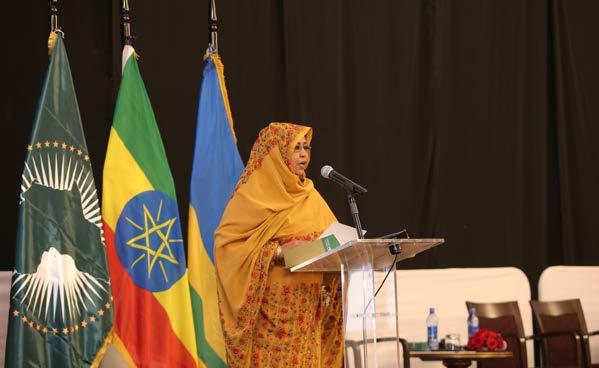
An ExCLUSIvE COnvErSATIOn WITh
H.E aMira El FaDil on the Saleema initiative
h.E Amira El Fadil is a sudanese government official. Fadil previously held the position of Minister of social Welfare and social Insurance for the government of sudan and was elected to a four-year tenure as Commissioner for social Affairs of the African Union (AU) Commission in 2016. While in post at the AU, Fadil launched the saleema Initiative to galvanise political action to enforce strong legislation, increase the allocation of financial resources and strengthen partnerships to end FGM, particularly within communities most impacted by the harmful practice.
In this conversation, we wanted to find out more about how H.E Fadil launched this continental initiative to end FGM and save 50 million girls at risk, while considering the impact of FGM. We also discuss progress, challenges and what we need to do to see an end to FGM. The saleema Initiative is not new. It is built on what is being done by our government and civil society, especially those that work in the area of fighting harmful traditional practices.
I found that when I came to the AU, I had the opportunity to introduce the saleema Initiative which had started in sudan. I was pleased as it was taken initially by the region, then at a higher level and eventually became an international initiative when the AU adopted it. African Union Heads of state and Government, at their 32nd ordinary summit, adopted and launched the saleema Initiative on Eliminating FGM through Assembly Decision Assembly/AU/Dec.737(xxxII). The Assembly also designated H.E. Roch March Christian Kaboré, President of burkina Faso, as the African Union Champion on Eliminating FGM.
I believe we need these kind of initiatives to transform the norms and gender inequalities that continue to perpetuate this harmful practice across the continent. The launch of the saleema Youth Victorious Ambassadors programme by the African Union Commission in 2020 mirrors this commitment from the Champion. In addition, the saleema Youth Victorious Ambassadors convene an accountability platform during the commemoration of the International Day of Zero Tolerance for FGM, February 6th, that demonstrate the important role young people, particularly those most affected by harmful practices, can play in accelerating elimination efforts.
The Impact of the Saleema Initiative
The impact of the saleema Initiative is paramount because the strategy includes a high-level commitment by our Heads of states and Governments. Their endorsement of this initiative means a committee will be implemented that will report back to the AU by each country which committed itself to the saleema Initiative and will be responsible to report back to the Minister that’s in charge and also report back to the AU. I would like to appreciate the support of partners, including the spotlight Initiative Africa Regional Programme with the United Nations and European Union, as well as the UNFPAUNICEF Global Programme on the Elimination of FGM, and the World bank through the sahel Women Empowerment and Demographic Dividend (sWEDD) Africa Regional Project.
The first ladies of Africa and the organisation also offered their role in disseminating the information and creating awareness, and they are also working with other International organisations and UN agencies to push saleema.
I think there is a very positive impact of saleema in the countries that still practice female filtration at high rates. I believe this impact will help us in having Africa free of FGM in two decades if this initiative continues to be implemented. If the wider community, organisations and the media get involved then Africa will be free from this awful, traditional practice.
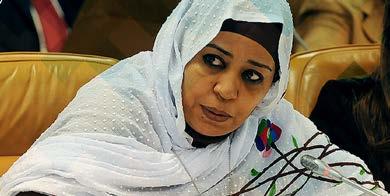
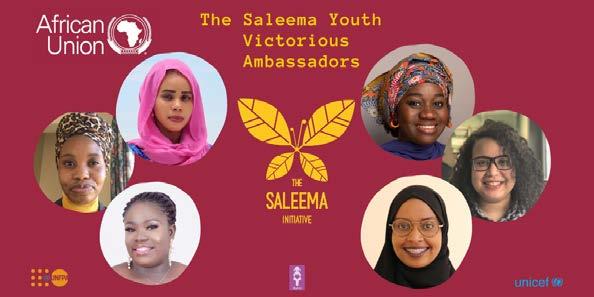
AYA CHEbbI,
The First Youth Envoy of african Union Speaks for The Youth
Ms Aya Chebbi is the first African union Youth envoy and the youngest diplomat at the African union Commission Chairperson’s Cabinet (2018 – 2021).
aya shares her views on actions against FGM and her recommendations to help change the narrative by 2030 in an interview with us.
With 65% of Africa’s population being under the age of 30, I represented not only the most youthful population in the world but the most innovative and educated. As a generation of change-makers, we want to see and shape a new model of leadership in Africa. The issues faced by the African youth are very complex as most youths are marginalised, unemployed and insecure about the political landscapes which they occupy. We end up with a generation in waithood, waiting for adulthood, unable to achieve financial freedom because of inequality, especially when we show the intersections of class, gender, race, and other relations of power.
on how FGM limits women from fulfilling their full potential
I championed many actions against FGM and other UNFPA campaigns as the African Union Youth Envoy. I have been subjected to hurtful cultural practices and rituals from my hometown in Tunisia. such practices among others always claim to protect women’s virginity but it is all about controlling women’s bodies and their choices. I was psychologically damaged and have met many other girls with health-related problems from FGM and cultural practices. The basic thing a woman needs is to own her voice, where she has the right to challenge things affecting her psychological and physical well-being.
on importance of FGM awareness Campaign
FGM awareness campaigns should include the cycle of violence that happens in the process of FGM. This is one of the many harmful practices affecting our community. In my opinion, we should intensify the conversations on GbV and FGM. This is a cycle and we need to explain it as it is; it is a cycle whereby we come to accept that the more girls go through FGM, the more likely they would go through child marriage, drop out of school, and become dependent. being dependent will hinder anyone from contributing to their fullest potential, thus to society. That said, it’s a cycle for girls and women because they cannot break out due to the psychological and physical effects on them. We should also sensitise society that FGM is not a myth, but a reality. An end to FGM should be a priority because any violence against women contributes to the cycle of women being trapped in inequality. Patriarchies are using this as a weapon to trap women in inequalities. It is essential to build an equal and equitable society and this can start when we all know it is our job to contribute to society.
on the effective measures to overcome FGM?
We need to, first of all, recognise and accept that we live in a society where FGM/GbV is rampant. Most people in the communities are in denial of FGM and GbV being violations of women’s rights and girls’ bodies. It is so astonishing, to listen to debates where there is a complete denial of that and listening to analyses that don’t relate FGM and GbV to human rights or security. both GbV and FGM are violent and therefore, this is an issues of peace and security. It is a crime and it should be treated like that.
Governmental institutions should put in place progressive policies that criminalise GbV including FGM and this should include the implementation process. We advocate for policy change and drive all of our efforts into it, only to see it go down the drain a few years down the line. All these should go hand in hand while we engage in the community and foster an enabling environment. We should amplify the voices of survivors and work together to end the stigma, open conversations to centre the issues around survivors’ voices and that of organisations leading this work on the ground.
“How can i put my daughters through that?”
– FATHER bECoMEs AN ADVoCATE AGAINsT FGM
Abdel Rehim was undecided on subjecting his two daughters to FGM, despite it being common practice in his village. Every time he brought up the topic with his wife, she would change the subject, having been cut herself
“I was always hesitant,” says the 30 year old father, “because my community does it to protect girls, thinking that through this, they are controlling their desires and setting them on a proper path.”
Under the UNFPAUNICEF Joint Programme on the Elimination of FGM, and with the support of the Royal Norwegian Embassy in Cairo, UNFPA partners with Care International to raise community awareness on the harms of FGM and other harmful practices. To help him decide, Abdel Rehim attended awareness raising sessions on FGM in his village in the Upper Egyptian governorate of Assiut.
“During the first session the trainer asked us to divide ourselves: pro-FGM against FGM and undecided,” he recalls, “I went to the neutral zone; I was really undecided and every discussion with family and friends would sway me from pro to against and vice versa.”After learning that FGM is a violation of the law, religion and human rights, Abdel Rehim says he was shocked to discover that FGM was such a crime.
Abdel Rehim returned home to his wife and asked her if she remembers the day she was cut. Her reply was even more shocking, she said, “Yes of course I do, it was the worst day of my life, I thought I was going to die’,” Abdel Rehim says his wife continued to describe the harrowing experience in full detail. she explained the pain she felt along with the side effects and most
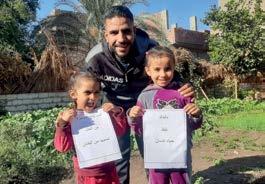
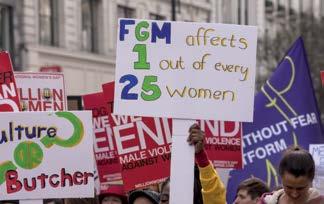
importantly the feeling of betrayal by her family.
“Her reply made everything crystal clear,” he says, “how are we even considering subjecting our daughters to that? I am not going to put my daughters through such an agonizing experience.”
Abdel Rehim explains that he would never think about betraying his daughters’ trust by exposing them to what he describes as an “inhumane” experience. He adds that such a practice would destroy their lives and cause long-term trauma.
“My daughters are the most precious thing to me, and I would protect them against anything,” he says, ”if being shamed by my family and community is the price I have to pay to protect them, then so be it.”
Abdel Rehim is now one of Care’s volunteers , conduct ing FGM awareness sessions, engaging men and boys training and advocating against FGM through every chance he gets. He also publicly declared his position against FGM.
UNFPA and Care International developed a manual on engaging men and boys around harmful practices to enhance positive masculinities and behaviours around gender and end FGM.
EQUaliTY NoW
PUsHEs FoR CHANGE!
EqUAlITY NoW Is A PoWERFUl INsTRUMENT sTRENGTHENING THE WoRK oN GENDER EqUAlITY AND HUMAN RIGHTs WITHIN THE HoRN oF AFRICA, AND CoMMUNITIEs.
While strengthening Multi-sectoral measures to eliminate FGM will involve addressing root causes including gender inequality, and harmful social norms, integrating FGM in humanitarian actions, accountability measures particularly enhancing the monitoring role of the NHRIs is equally critical and important. This is even more urgent as UNFPA and partners take forward the implementation of the commitment of the Nairobi summit on the ICPD 25, reflective of the reaffirmed commitment to zerotolerance FGM. The role of Equality Now has been very instrumental in strengthening the work on Gender Equality and human rights within the Horn of Africa and communities. Equality Now pushes for states’ accountability towards the realisation of gender equality in line with International and Regional Human Rights Conventions they have signed and ratified. To this end, we push for states to put in place laws prohibiting FGM and therefore protecting women and girls from FGM. Having a law in place enables women and girls to enforce their rights and seek accountability from the government through the court.
Equality Now together with its partners, such as Institute for Human Rights and Development in Africa (IHRDA), Association Malienne pour le suivi et l’orientation des Pratiques Traditionnelles (AMsoPT), and Association pour le Progrès et la Défense des Droits des Femmes au Mali (APDF), are seeking to hold the Government of Mali to account for failing to protect women and girls from FGM in line with its human rights obligations before the ECoWAs Court of Justice.
In Kenya, the Prohibition against FGM Act (the AntiFGM Act) was challenged in court as unconstitutional for not allowing women the right to practice their culture. The issue at hand was the right to consent to FGM, which Equality Now as one of the Interested Parties to the case opposed, as FGM is recognised as a form of torture and the right to be protected from torture is a non-dirigible right. Therefore, the Anti-FGM Act was declared constitutional strengthening the campaign against FGM.
The HRC Resolution has been advantageous to Equality Now as it gives strength to what they have been advocating for, particularly the adoption and strengthening of the multisectoral approach to end FGM, the need to build the capacity of all government actors that come into contact with survivors of FGM, the need to have more shelters and safe spaces for women and girls, and the importance of the governments to allocate more funding to programs ending FGM and to the bodies coordinating national activities on FGM. Equality Now recognises that FGM cannot end only through the presence and implementation of law alone, therefore there is a need to engage the community to change social and gender norms.
The NHRIs could support and strengthen the campaign to end FGM by highlighting FGM in their annual report on human rights and also when submitting their reports to the International and Regional Human Rights mechanisms. Additionally, joint implementation of activities with the FGM - Coordinating mechanisms would be instrumental in showing that FGM is a human rights issue that should concern everyone and not just a women’s rights issue.
CoVID has impacted how we work because any activity concerning community awareness has to consider the case of new infections at that time and in that region . When the cases are high, the session has to be postponed to reduce the risk of spreading the virus. Programmatically, it has shown the glaring gap in the provision of safe spaces for girls fleeing FGM and victims of FGM, as during the height of the pandemic, they were forced to stay at home. Consequently, we are advocating for the establishment of safe spaces and shelter in every county/region and for their funding to enable them to deliver service to those who need it the most.
Equality Now plans to continue its training of state actors on access to justice for survivors of FGM and advocacy with political and traditional leaders on the implementation of laws ending FGM, and more budgetary allocation for FGM prevention and response programs. Funding is an important component and without it, it is impossible to speak of law or implementation. We intend to encourage the coordinating mechanisms to collaborate more with the NHRIs in their respective countries.
The voices of FGM survivors remain the core of our advocacy against FGM. Therefore, we intend to give more survivors opportunities to share their stories and continue to push for accountability from state actors to ensure that there is access to justice for all FGM survivors. Additionally, we will use their stories to push the government to strengthen law implementation to protect other women and girls from undergoing this harmful practice.











